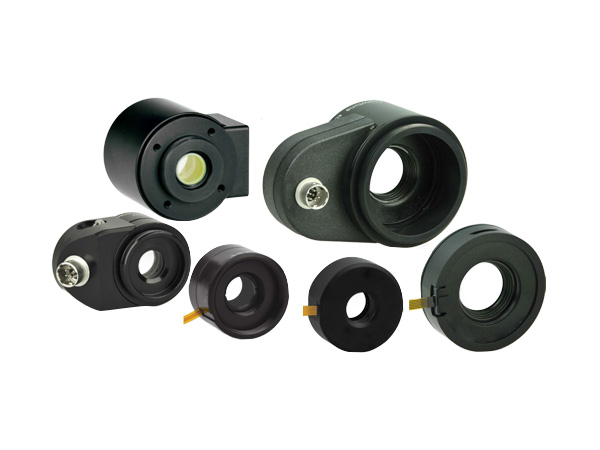
Our focus tunable lenses was inspired by the working principle of the human eye. Within milliseconds, the focal length of our electrical lenses is tuned by applying a control current. The unique principle enables the design of faster and more compact
Within milliseconds, the focal length of our electrical lenses is tuned by applying a control current. The unique principle enables the design of faster and more compact optical systems without complex mechanics. We are a leading supplier of focus tunable lenses for perse applications. Whether electrically or mechanically actuated, the advantages of tunable lenses over traditional optics are striking. Our lenses can be tailored to your specific demands in terms of size, tuning range, transmission range or speed. Tell us your requirements and we will be happy to assess the feasibility.
Compact design
Less mechanics
Fast response
Low power
Less tolerance sensitivity
Our electrical lenses are current controlled. There are several options for current drivers ranging from regular lab power supplies to tiny VCM driver ICs. We offers a high-precision USB driver with a resolution of 0.1mA, which includes read-out of integrated temperature sensors over I2C.
The following table summarizes the main specifications of our most popular focus tunable lenses:
| STOT-EL-3-10 | STOT-EL-10-30 Series | STOT-EL-12-30-TC | STOT-STOT-EL-10-42-OF | STOT-STOT-EL-16-40-TC Series | STOT-ML-20-37 Series | |
| Specs |  |  | 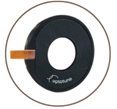 | 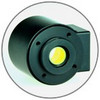 | 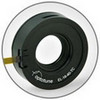 |  |
| Product description | Fast electrically tunable lens | Fast electrically tunable lens | Electrically tunable | Fast electrically tunable lens | Fast electrically tunable lens | Manually tunable lens |
| Size (ØxH) | 10x4.0mm | 30mm x 9.7mm | 30x5.8mm | 42mm x 36mm | 40mm x 11.9mm | 37mm x 8mm |
| Clear aperture | 3mm | 10mm | 11.6mm | 10mm | 16mm | 20mm |
| Lens Type | Plano convex to plano concave | Plano convex | Plano-concave to plano-convex | Plano convex + plano concave offset lens | Plano convex to plano concave | Plano convex to plano concave |
| Focal length range | +50 to +120mm | +20 to +140mm | -167mm to +100mm | -500 to +500 mm | -500 to +333 mm | -40 to +40mm |
| Refractive Index | 1.300 | 1.300 or 1.559 | 1.45 | 1.300 | 1.300 | 1.300 or 1.559 |
The compact STOT-EL-3-10 lens was designed for OEM integration into optical systems for various applications. The working principle is based on the well-established shape-changing lens technology. The curvature of the lens is adjusted by applying an electrical current. Thereby, the focal length is tuned to a desired value within very few milliseconds. The lens architecture is “push pull” which means that the lens curvature is deflected from concave to convex. With actuators based on proven voice-coil technology, the STOT-EL-3-10 focus tunable lens is extremely reliable and robust, well suited even for applications in harsh environments over large temperature ranges.

STOT-EL-3-10 is the ideal choice for:
Imaging up to 1/1.8” sensors
Biometric systems
Optical coherence tomography (OCT)
Laser illumination
Clear aperture: 3.0 mm
Outer diameter: 10 mm (11mm on flange)
Height: 4 +0/-0.2 mm
Weight: 1.25 g
Lifecycles (10-90% sinusoidal): >1‘000‘000’000 CL
Control current (typical): -120 to +120 mA
Operating voltage: -1…1 V
Coil resistance at 30°C: 7.1 Ohm
Power consumption (full tuning range): 0 to 100 mW (P = RCoil x i2)
Power consumption (+/- 5 dpt tuning range): 0 to 15 mW
Settling time: 2/4 ms (Low pass filtered / normal step signal)
Focal tuning range (@20°C): -77 to +77 mm
Focal power range (@20°C): -13 to +13 dpt
Wavelength range: 420 to 1600 nm
Wavefront error @525nm (vertical/horizontal):<0.2/ <0.2 λRMS (Tighter spec available upon request (e.g. 0.07 λRMS))
Refractive index nD (589.3nm): 1.300
Abbe number Vd: 100
Optical damage threshold: >1 kW/cm2
Operating temperature: -20 to +65 °C
Storage temperature: -50 to +85 °C
| Standard products | Tuning range | Flex cable | Cover glass | Container- and/or cover glass coating | Wavefront error |
| STOT-EL-3-10-VIS-26D-FPC | -13 to +13 dpt | Yes | Yes | 420 – 900 nm | <0.2/ <0.2 λ |
| STOT-EL-3-10-NIR-26D-FPC | -13 to +13 dpt | Yes | Yes | 850 – 1600 nm | <0.2/ <0.2 λ |
| STOT-EL-3-10-VIS-26D-OEM | -13 to +13 dpt | No | No | 420 – 900 nm | <0.2/ <0.2 λ |
| STOT-EL-3-10-NIR-26D-OEM | -13 to +13 dpt | No | No | 850 – 1600 nm | <0.2/ <0.2 λ |
| STOT-EL-3-10-VIS-26D-OEM-CG | -13 to +13 dpt | No | Yes | 420 – 900 nm | <0.2/ <0.2 λ |
Remark: (1) 420-900 nm T>94%; (2) 850-1600 nm T>94%
The compact STOT-EL-3-10 lens can be driven with our STOT-EL-E-4 lens driver by simply connecting the flex cable of the lens to the Molex connector on the lens driver. In our software interface, the current to the lens can be adjusted to drive the lens. It’s important to note that +/-120 mA are required to tune across the whole optical power range. As the lens driver can output more current, it has to be connected to the PC without the lens connected first. Then, in the “Hardware Configurations” tab, the software limit has to be set to +/-120mA. Afterwards the lens driver can be disconnected, the lens connected to the lens driver and the lens driver connected back to the PC. The current will now only be adjustable from +/-120mA, hence an overdriving of the lens can be prevented.
The working principle of the STOT-EL-3-10 is based on ours well-established technology of shape-changing polymer lenses. The core that forms the lens contains an optical fluid, which is sealed off with an elastic polymer membrane. An electromagnetic actuator is used to exert pressure on the container and therefore changes the curvature of the lens. By changing the electrical current flowing through the coil of the actuator, the optical power of the lens is controlled.
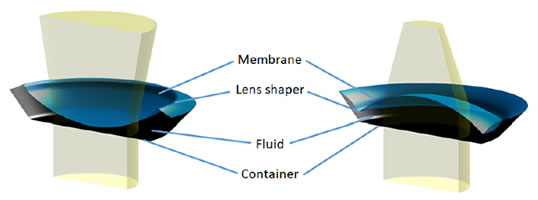
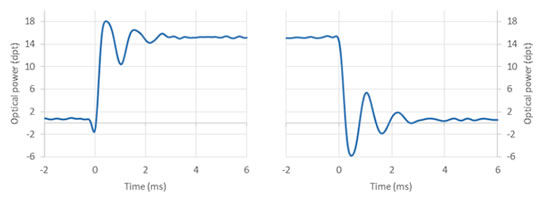
The rise time when applying a current step is<1 ms and it takes only about 4 ms until the lens has fully settled. The graphs of the step response measurements below show the optical response of the STOT-EL-3-10 lens. Low pass filtering of the drive signal to the lens allows to damp the oscillations seen in the step response graphs below and as a result drive a controlled 80% step in <2ms.
The optical power of the STOT-EL-3-10 increases with positive current and decreases with negative current as shown as follows. The specified optical power range is from +13 to -13 diopters.
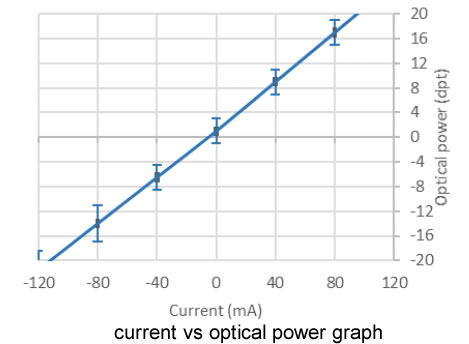
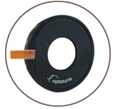
The compact STOT-EL-12-30-TC lens is designed for OEM integration into optical systems for various applications. The working principle is based on the well-established shape-changing lens technology. The curvature of the lens is adjusted by applying an electrical current. Thereby, the focal length is tuned to a desired value within a few milliseconds. The lens architecture is “push pull” which means that the lens curvature is deflected from concave to convex. With actuators based on proven voice-coil technology, the STOT-EL-12-30-TC focus tunable lens is extremely reliable and robust, well suited even for applications in harsh environments over large temperature ranges.
Lens specifications
| Clear aperture | 11.6 | mm |
Focal power range: (25°C, ±250 mA) | -6 to +10 | dpt |
Focal power @ 0 mA (25°C, typical) | -1 to +2 | dpt |
Transmission range | VIS: 450 to 1050 | nm |
Wavefront error @ 0 dpt (Optical axis vertical / horizontal) | 0.15 / 0.23 | λ RMS @ 532 nm |
Lens type | plano-concave to plano-convex | |
Refractive index / Abbe number | nD = 1.45 / ν = 55 | |
Response time (typ. at 25°C, 0 to ±250 mA step) | 3 | ms |
Settling time (typ. at 25°C, 0 to ±250 mA step, ±0.1 dpt) | 10 (with signal conditioning) 20 (rectangular step) | ms |
Lifecycles (-200mA to + 200mA, sinusoidal, 20Hz) | > 1’000‘000’000 | |
Operating temperature | -20 to 65 | °C |
Storage temperature | -40 to 85 | °C |
Weight | 10.5 | g |
Electrical specifications
Nominal control current | -250 to 250 | mA |
Absolute max. control current | -300 to 300 | mA |
Motor coil resistance @ 25°C | 15 | Ω |
Power consumption for 5 dpt range (±60mA) | 55 | mW |
Max power consumption (@ 250 mA) | 940 | mW |
Memory | ON Semiconductor: CAT24C64C4CTR (or similar) | |
Temperature sensor | Maxim Integrated: MAX31875R2TZS+T (or similar) | |
Absolute maximum voltage (coil) | 6 | v |
Absolute maximum voltage (memory & sensor) | 4 | v |
Ordering Information
Part Number | Tuning range | Top Thread | Bottom Thread | Controller |
STOT-EL-12-30-TC-VIS-16D | -6 to 10 dpt | None | None | - |
STOT-12-30-TC-VIS-16D-C | -6 to 10 dpt | C-mount male | C-mount female | - |
STOT-EL-12-30-TC-VIS-16D-C-E | STOT-ECC-1C in Hirose adapter |
All models are available with NIR coating or custom coating upon request
With a clear aperture of 16mm we presents the world’s largest electrically focus tunable lens. Its design has been optimized in many ways:
The 60% larger aperture than its predecessor, the STOT-EL-10-30, allows for 2.5x more light throughput
The tunable lens can be shaped from a flat zero-state into a plano-concave or plano-convex lens, resulting in a focal tuning range of up to -10 to +10 diopters (at -250 to +250mA)
The design was optimized to minimize thermal drift effects to as little as 0.02 dpt/°C and with the built in temperature sensor, an overall reproducibility of typically +/- 0.05 diopters is achievable
Response & settling times are 5 & 25ms, respectively, which is still magnitudes faster than most mechanical alternatives
Integration of the lens shaper inside the container allows for the highest possible positioning accuracy of the tunable lens
The STOT-EL-16-40-TC is available in its compact form for OEM integration but also with multiple thread adapters and a robust Hirose connector for industrial use, where the tunable lens can be easily combined with off-the-shelf imaging lenses.
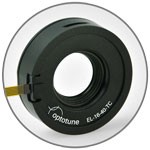 | 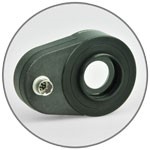 |
| STOT-EL-16-40-TC (OEM version) | STOT-EL-16-40-TC with thread adapters (industrial version) |
The STOT-EL-10-30-C has two main optical configurations:
The basic configuration has planar cover glasses and a focal tuning range of 200mm down to 100mm, making this the best choice for macro imaging.
The "MV" configuration is optimized for the machine vision market. It contains a negative offset lens so that the overall focal tuning range goes from slightly negative down to 286mm, making this the ideal choice for combinations with infinity corrected fixed-focus lenses.
The following table summarizes the main specifications of the STOT-EL-16-40-TC series:
| Standard products* | Tuning range | Wavefront error** | Top thread | Bottom thread |
| STOT-EL-16-40-TC-VIS-5D | -500 to 333 mm -2 to 3 dpt | <0.25 / <0.5 λ | None | None |
| STOT-EL-16-40-TC-VIS-20D | -100 to 100 mm -10 to 10 dpt | <0.50 / <2.5 λ | None | None |
| STOT-EL-16-40-TC-VIS-5D-M25.5 | -500 to 333 mm -2 to 3 dpt | <0.25 / <0.5 λ | M25.5x0.5 male | M40.5x0.5 female |
| STOT-EL-16-40-TC-VIS-5D-M27 | -500 to 333 mm -2 to 3 dpt | <0.25 / <0.5 λ | M27x0.5 male | M40.5x0.5 female |
| STOT-EL-16-40-TC-VIS-5D-M30.5 | -500 to 333 mm -2 to 3 dpt | <0.25 / <0.5 λ | M30.5x0.5 male | M40.5x0.5 female |
| STOT-EL-16-40-TC-VIS-5D-C | -500 to 333 mm -2 to 3 dpt | <0.25 / <0.5 λ | C-mount male | C-mount female |
| STOT-EL-16-40-TC-VIS-5D-M42 | -500 to 333 mm -2 to 3 dpt | <0.25 / <0.5 λ | M42x1 male | M42x1 female |
* All models are available with a 6-pin FPC connector. The models with thread adapters come with a 6-pin Hirose connector
** Wavefront error provided in λ RMS @525nm with optical axis vertical / horizontal
Applications
Applications for Our STOT-EL-16-40-TC are among others:
Machine vision
Microscopy
True 3D in augmented and virtual reality
Refraction correction in ophthalmic devices
The STOT-ML-20-37 adapts itself to your specific requirements. By manually rotating an adjustment ring, the lens changes its shape from convex to flat or to concave. This unique feature allows you to choose and finely tune the focal length of the lens within -40 to +40 mm range. 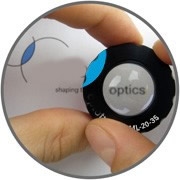
LED illumination
Optics R&D (e.g. beam expander)
Education
OphtalmologySystem prototyping
Optical aperture:1 20mm
External diameter: 37mm (39 includirs)
Thickness: 13.2 mm
Weight: 13.7g (without adapter) / 25.2 (with adapter)
Max torque: 80 mNm (at gear teeth)
Full tuning angle: 337 °
Lens type: from plano-convex to plano-concave
Optical power tuning range (BFL): -18 to +18 Dpt
Focal tuning range (BFL): -55 to infinity to +55 mm
Focus resolution: Depends on motorization
Optical liquid (Refractive index) @20°C: 1.38
Optical liquid (Abbe number): V 65
Transmission spectrum: See Figure 2
Wavefront error (@525 nm, 5mm CA): 0.95λ RMS (across tuning range); 0.19λ RMS (at 0 dpt)
Polarization preserving
Operating temperature: 10 to 40 °C
Storage temperature: -20 to +75 °C
Humidity: 30-50% R.H. (non-condensing)
Lifetime (#random cycles): 5 mio #
| Standard product number | Turning range | AR coating | C-mount adapter |
| STOT-ML-20-37-VIS-36D | -18 to +18dpt | 400-700nm | no |
| STOT-ML-20-37-VIS-36D-C | -18 to +18dpt | 400-700nm | yes |
Figure 1 shows the dimensions of the STOT-ML-20-37 lens. The back-focal range is measured from the mating surface of the housing of the OEM lens. This surface lies 5.4 mm behind the outermost surface of the C-mount adapter. The ring is used to set the focal range to the desired value.
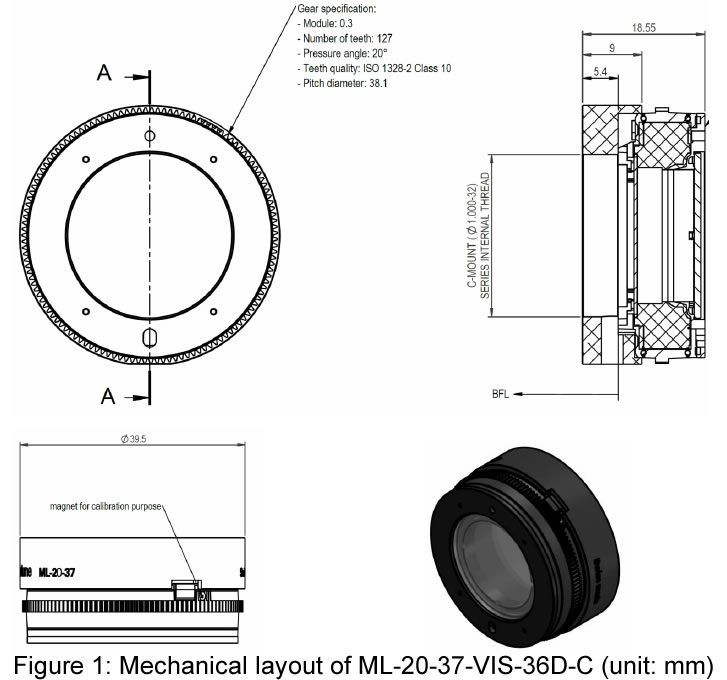
The STOT-ML-20-37 can be motorized using either a direct drive or a worm gear. The magnet can be used for calibration purposes.
Both the optical fluid and the membrane material are highly transparent in the range of 400 to 2500 nm. As the membrane is elastic it cannot be coated using standard processes, hence a reflection of 3 – 4 % is to be expected. Cover glasses can be coated as desired. Figure 2 shows the transmission spectrum for the standard broad-band VIS coating.
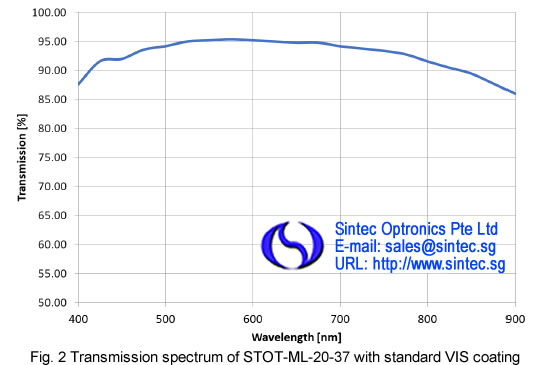
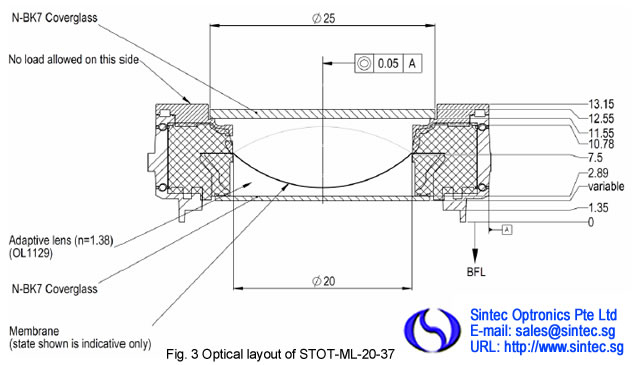
Figure 3 contains the information needed to model the STOT-ML-20-37 lens for simulation. A precise ZEMAX model can be given upon request. As the cover glass is moved up and down, the membrane deflection changes continuously.
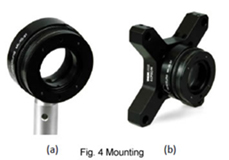
As depicted there exists different mechanical mounting possibilities of the C-mount version. For mounting recommendations of the version without C-mount adapter, please contact us.
Figure 4:shows mounting possibilities for the STOT-ML-20-37-C.
(a) STOT-ML-20-37-VIS-LD-C shown with a standard 1/2” optical post mount with M4 screw.
(b) STOT-ML-20-37-VIS-LD-C mounted to a 30 mm to 60 mm Cage Plate Adapter (LCP02/M) with the help of a C-mount to SM1 adapter ring (SM1A39)
The product fulfills the RoHS and REACH compliance standards. The customer is solely responsible to comply with all relevant safety regulations for integration and operation.
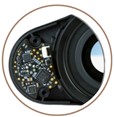
STOT-ECC-1C allows to control liquid lenses directly from camera or embedded systems, thus offering a compact and convenient solution for fast integration.
Main features:
Connects directly to cameras and embedded systems
Current control from -300 to +300 mA in 80 µA steps
Communication interfaces:
UART and I2C (autodetect)
Analog input (0 - 10V)
GPIO trigger
Read-out of calibration data & temperature for compensation ("Focal Power Mode")
Graphic user interface for control via UART, USB to UART cable available
Software SDKs for Python and C# available
RoHS, REACH and CE declaration of conformity
Mechanical specifications
Dimensions (L x W x H) | 27 x 20 x 5 | mm |
Weight | 5 | g |
Connector | Hirose HR10G-7R-6SB (73) | |
Max. USB cable length extension¹ | 5 | m |
Max. lens cable length (USB to UART) ² | 1 | m |
Electrical specifications
Supply voltage range | 5 / 9-24 (tolerance ± 5%) Two input voltage ranges (no operating window in between) | VDC |
Absolute maximum supply voltage | 26 | VDC |
Nominal control current ³ | -300 to 300 | mA |
Current step | 80 | µA |
Current repeatability | ± 1 | mA |
Maximum power consumption (5V / 9-24V) | 1.5 / 2.5 | W |
Analog voltage inputs level | 0-10 | V |
Absolute maximum analog voltage input | 11 | V |
Analog input resolution | 12 | Bits |
Analog input impedance | >70 | KΩ |
Digital interfaces | GPIO, UART, I2C | |
Digital signal logic level | 3.3 | V |
UART Simple mode command latency⁴ | 310 | µs |
I2C command latency⁵ | max. 100 | µs |
1.Maximum tested cable length in lab conditions, actual performance may depend on electromagnetic environment. Longer lengths are possible using active USB cables.
2. Maximum tested cable length in lab conditions. Maximum cable length may depend on electromagnetic environment. Higher cable lengths should comprehend lower baud rates.
3.Input voltages and thermal limitations apply, see Figure 4, 5, 6 and 7.
4.Average delay between end of command on UART RX line and output change using simple mode commands in Terminal app. Generally, the whole configuration time varies with command length, speed of communication and its mode, infrastructure, control host, operating system, programing language etc. This delay time variation also applies for protocol mode commands.
5.Analogically defined delay but using I2C communication bus. It corresponds also to latency of GPIO input trigger by both rising and falling edge.
Thermal specifications
Operating temperature | 0 to 65 | °C |
Storage temperature | -40 to 85 | °C |
The STOT-ECC-1C can be part of STOT-EL-16-40 lenses or ELMs (electrical lens modules) or ordered separately.
Currently two cable options are provided.
Part number | Description |
150-347-00 | Hirose adapter kit with STOT-ECC-1C |
150-349-00 | USB to UART cable, Hirose connector, 1m |
152-219-00 | CAB-6-100-M-OE (Hirose to open-ended wire cable, 1m) |
149-740-01 | STOT-EL-16-40-TC-VIS-5D-C-E (Typical STOT-EL-16-40 lens with STOT-ECC-1C integrated) |
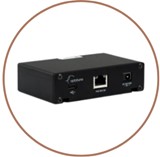
Main features:
Industrial current controller with robust casing and a DIN rail adapter
1 channel output for driving tunable lens (current up to +/-500 mA)
High output current stability in the whole temperature range
Communication and other interfaces:
Power supply options:
USB, I2C, UART, Ethernet with PoE+ capability
Analog input (0 – 10 V)
Trigger Input/Output signals
2x Status LEDs (Red/Green/Orange)
Power supply options:
Barrel connector
PoE (RJ-45 connector)
USB-C Power Delivery
Graphical user interface for control via USB, UART¹ or Ethernet
Software SDKs for Python and C# are available
RoHS, REACH and CE certified
Mechanical specifications
Dimensions (L x W x H) | 64 x 105 x 28.7 | mm |
Weight | 240 | g |
USB Connector | USB-C | - |
Max. USB cable length² | 2 | m |
Max. lens cable length (Hirose)³ | 5 | m |
Accepted DC Barrel Plug | 2.1 I.D. x 5.5 O.D. x 10.0 | mm |
Output connector | Hirose HR10G-7R-6SB (73) | |
Auxiliary output connector | Standard rectangular header, 100” (2.54mm) pitch | 10 pins |
I/O connector | Standard rectangular header, 100” (2.54mm) pitch | 14 pins |
Mounting | T-slots for standard M4 nut |
Thermal specifications
Operating temperature | 0 to 45 (+/- 500 mA) 0 to 65 (+/- 300 mA) | °C |
Storage temperature | -40 to 85 | °C |
Supply voltage range typical | 5 to 48 | VDC |
Supply voltage range absolute limits | 4.75 to 57 | VDC |
PoE specification | PoE (802.3af or higher) | |
USB-C power delivery requirement (min) | 15 | W |
Total power consumption (max) | 15 | W |
1. The software supports UART which is available on the I/O connector. A compatible CP210X USB to UART Bridge must be used.
2. Maximum tested cable length in lab conditions, actual performance may depend on electromagnetic environment. Longer lengths are possible using active USB cables.
3. Maximum tested cable length in lab conditions. Maximum cable length may depend on electromagnetic environment.
Driver outputs
Maximum output current | ±500 | mA |
Minimum output current step | 65 | µA |
Resolution | 14 | bits |
Output current thermal stability | 0.5 | mA |
Front-end voltage⁴ (configurable) | 6 – 15 (factory default = 12 | V |
Output voltage limit | 6 – 15 | V |
Output stage topology | Full bridge, filtered PWM (load not grounded) | |
Digital communication with lens | Dedicated I2C bus, 400kHz max | |
I2C logic level (pullups implemented) | 3.3 | V |
Power supply for I2C (output channel) | 3.3 | V |
Power for logics, max. current | typ. 100 | mA |
Status LED (main + output channel) | Red, Green, Orange LED |
4. The front-end voltage supplies the output stage. The output voltage is slightly lower than the front-end voltage.
Analog input leve | 0 – 10 | V |
Analog input resolution | 16 | Bits |
Analog input BW | 10 | kHz |
Digital inputs | GPIO, I2C, UART | |
Digital inputs logic level | 3.3 (NOT 5 V tolerant) | V |
Ordering Information
Part number | Description |
STOT-ICC-1C | STOT-ICC-1C Controller with a DIN rail adapter |
STOT-ICC-1C Controller Kit | The Controller Kit contains:
|
STOT-ICC-1C PCBA Controller | STOT-ICC-1C PCB only (OEM) version |
A leading supplier and manufacturer of a wide range of photonics products such as lasers,laser parts & machines.
Office: 10 Bukit Batok Crescent #07-02 The Spire Singapore 658079
Tel: +65 63167112
Fax: +65 63167113
Whatsapp: +65 91904616
